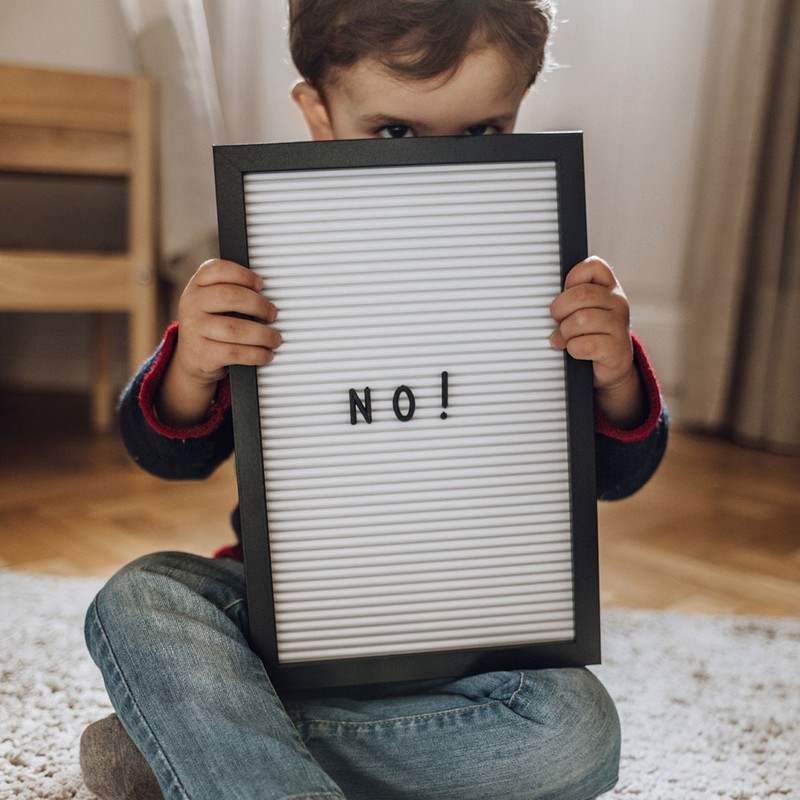
How To Tame A Tantrum

“Tantrums are normal and a necessary part of a child’s development. They are usually caused by a child feeling overwhelmed, powerless or frustrated – feelings that are common for a small child, who doesn’t yet have the words to express how they feel at a time when they want to become more independent. Tantrums are likely to start between the ages of 18 months and two years. This is when a child is starting to master control of its own body, but this fast pace of physical development races ahead of emotional development, hence the fireworks. As adults, our reasoning and emotions are governed by our frontal lobes, which put the brakes on impulsive behaviour; at this time, a toddler’s brain is only just getting wired up. Remember your child doesn't enjoy having a tantrum. What they want most is to feel safe and back in control. See it as a necessary phase your toddler will pass through.” – Tanith Carey, author of What’s My Child Thinking? Practical Child Psychology for Modern Parents

“Tantrums are a common reaction when children feel an emotional imbalance in terms of not getting their needs met. This is particularly relevant for children three years of age and above. If your child is having a tantrum at this age, it generally indicates a desire for a closer connection with the parent. In order to become emotionally regulated, children need to connect with their attachment figures; they need to be co-regulated with the adults who make them feel safe. Spend what Dr Rachel Pinney calls ‘special time’ with your child using a skill she calls ‘creative listening’. Special time enables you to connect with your child, helping them to feel secure and safe. Aim to set aside up to one hour each day (30 minutes at the least) playing with your child. Listen to what they want to play with and follow their lead. Praise them often, which reassures and comforts them.” – Amanda Seyderhelm, certified play therapist

“A general lack of choice in a child’s day-to-day life is a contributor to tantrums. You may not be able to avoid them completely, but you can certainly reduce the number of them by giving your child more control over their environment. For example, allow your child to pick their own clothes, which plate they want to use, and which book to read. This way, your child has more autonomy and control in their life, and will be less likely to need more aggressive methods to pull control.” – Viktoria Paniotova, child psychologist, MEplace

“Look for flashpoints like transition times – when a child switches from one activity to another – such as going from playing with their toys to having a bath. These can be a real wrench for a toddler, so give them plenty of warning. Say you understand they are sad to have to do something new, so they won’t feel the need to protest as much. Also give them time to finish what they are doing and prepare them for the next step by giving gentle and firm warnings such as, ‘One more turn making a Lego tower and then it’s bath time.’ As much as possible, establish a schedule for sleeping, playing and mealtimes. If a child is hungry and their blood sugar is low, their bodies will release stress hormones that will make them more reactive.” – Tanith
 “It’s tempting to use ‘shock and awe’ techniques, such as shouting, when your child is having a tantrum, but yelling at a child in this state is like pouring petrol on a fire. During a tantrum, your child’s brain is already in a state of fight or flight and this will raise it further. When you shout at a child, you may get a couple of seconds’ reprieve as the child looks at you in shock, but then they will most likely resume the tantrum – and it will be at a much louder volume in response and will keep going for longer. What your child most needs is calm, empathetic parenting so they can learn to calm themselves and feel back in control.” – Tanith
“It’s tempting to use ‘shock and awe’ techniques, such as shouting, when your child is having a tantrum, but yelling at a child in this state is like pouring petrol on a fire. During a tantrum, your child’s brain is already in a state of fight or flight and this will raise it further. When you shout at a child, you may get a couple of seconds’ reprieve as the child looks at you in shock, but then they will most likely resume the tantrum – and it will be at a much louder volume in response and will keep going for longer. What your child most needs is calm, empathetic parenting so they can learn to calm themselves and feel back in control.” – Tanith

“The mere perception of tantrums as misbehaviour is inaccurate. By nature, children aren’t throwing tantrums because they want to – that is how they feel. The trigger for a tantrum can seem trivial to us adults, but it is not for the child. Some children have an easier temperament, while others have a more difficult temperament, thus are more prone to throwing tantrums, but still, they have nothing to do with misbehaviour. When your child is throwing a tantrum, try to acknowledge their feelings – show empathy, offer a hug, offer an alternative resolution, give a child time to express their emotions, and forget what other people might think if you’re out in public.” – Viktoria

“Giving in to a tantrum is counterproductive as it makes your child think this kind of behaviour will lead to them getting what they want. Stay empathetic and kind, but say, for example, you’re in the supermarket and have decided not to buy another toy, don’t feel under pressure to do so just because your child is crying. Offer your love and support to deal with their frustration, as well as explaining to your child the reasons behind your actions.” – Viktoria


“A lot of adults struggle with their child's tantrums because of their own upbringing. If you were raised by authoritarian parents (those who would tell you off, punish you or send you away to your room) then it's very likely you will struggle with your child's tantrums, because they will be a trigger for you. You will have a subconscious response that is essentially you reliving what your parents did to you; you may find yourself saying words your parents used and you may feel irrationally angry too. Noticing this response is a huge step. It’s all about being mindful of your own emotions and learning to control them, because you can't raise a calm, emotionally literate child if you're still throwing your own temper tantrums. Deep breaths, mindfulness exercises, journaling and inner-child therapy work are all hugely helpful.” – Sarah Ockwell Smith, childcare author & parenting expert

“As upsetting as it may be, behaviour like hitting, kicking and biting is a normal part of your child’s development and may appear in a tantrum. Try to avoid shocking them into compliance by hitting them back. Instead, firmly but calmly hold their legs or arms to stop the blows, and use the same tone to say 'no' very clearly. Responding without anger will help them regain control of their feelings. When your child becomes rational again, tell them you understand they were frustrated with you. Make it clear hitting is always the wrong way to show his anger. Repeat the ground rule: ‘In our family, we do not hit.’” – Tanith

“Try to avoid using annoying and aggravating phrases such as, ‘If you do that, x will happen,’ ‘Mummy/daddy would be so cross to see you doing this,’ and ‘Everyone is looking at us, stop embarrassing us.’ Instead, try to use helpful phrases that help to maintain connection with your little one, such as, ‘I know it’s hard,’ ‘I’m listening,’ ‘I love you,’ and ‘I’m with you.’” – Amanda

“The shame parents feel when other people see their child having a tantrum can often make things worse. This is because, when a child has a tantrum, the parent’s own brain goes into fight-or-flight mode, or they try to ‘showboat’ firm parenting to show who’s in charge. However, this can make it hard to respond in a calm way, which is what your child really needs. Try to avoid seeing tantrums as a sign of defiance or naughtiness designed to make your life harder.” – Tanith

“If your child’s tantrums involve aggressive behaviour towards you or self-injury, last longer than 25 minutes, or if there are more than ten tantrums a day at home or more than five outside of the home on multiple times a month, it could be worth seeking professional help. If you are becoming concerned about your own stress levels, are feeling frustrated, or uncertain on how to handle the tantrums, this could also be a sign that it’s time for some support. Start by speaking with your GP for a recommendation for a local child psychologist. You can also use the websites of the British Association for Counselling and Psychotherapy (BACP), Association of Child Psychotherapists or the British Psychological Society to find a child therapist.” – Viktoria
Visit AmandaSeyderhelm.com and MePlace.co for more information. The Gentle Discipline Book by Sarah Ockwell-Smith and What’s My Child Thinking? Practical Child Psychology for Modern Parents by Tanith Carey with Dr Angharad Rudkin, are both available now.
DISCLAIMER: We endeavour to always credit the correct original source of every image we use. If you think a credit may be incorrect, please contact us at info@sheerluxe.com.
/https%3A%2F%2Fsheerluxe.com%2Fsites%2Fsheerluxe%2Ffiles%2Fwebsite-images%2F2025%2F04%2Fnew-parenting-background-image.jpg?itok=au3AjSlw)